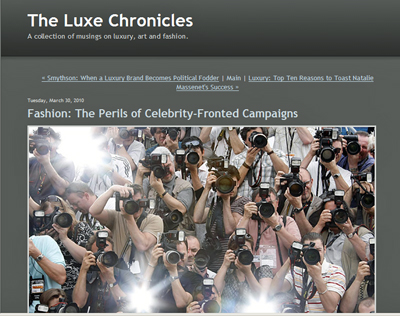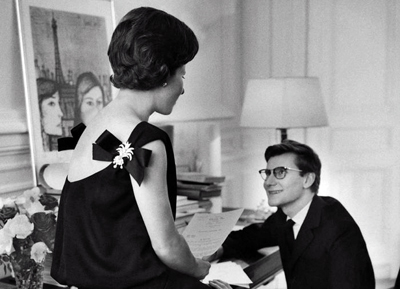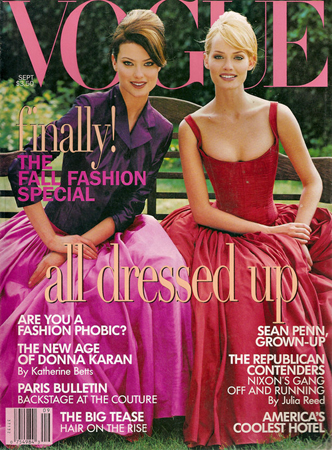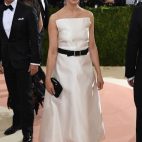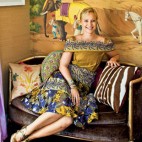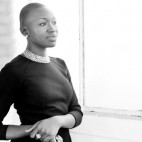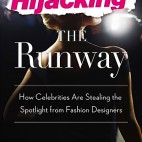Apr.
7
Luxe Chronicles Interview
HELENE LeBLANC, founder of The Luxe Chronicles represents the next generation of great fashion writers. Independent and informed, Helene possesses that rare ability to succinctly summarize exactly what is or is not important in the world of fashion and luxury. And let’s face it, much of what we read in traditional media these days is over-hyped and contrived, so its refreshing that The Luxe Chronicles is written from the viewpoint of an educated consumer. In fact, Helene is adamant in her belief that knowledge is essential to consumers making informed purchases and that luxury brands and magazines should listen and respond to the needs of all consumers.
Through the power of the Internet, Helene and I have been conversing for several months now, and I can assure you that she is super-smart, super-savvy, and a woman of style and substance. She is most assuredly one of my favorite people and I am honored to share this insightful, must read interview with you.
What did you hope to accomplish with The Luxe Chronicles?
I started The Luxe Chronicles in October 2007. At the time, luxury goods were still selling briskly and the possibility of a near collapse of the international financial sector hadn’t occurred to anyone yet. The luxury industry had expanded dramatically over the preceding two decades and what had long been a sector composed largely of small, independent, family run businesses had been reorganized following a wave of acquisitions and was now dominated by large conglomerates. Many brands were aggressively pushing brand extension and the “democratization of luxury” or “masstige” as a model for growth and we were awash in the glitzy, glamorous side of the industry.
At the time, consumers seemed perfectly willing to accept any product labeled “luxury” without question and pay handsomely for it. I wanted to challenge luxury consumers to ask themselves: “What are these brands selling me?”, “How, where and under what conditions was this product made?” and most importantly, “Why should I spend my hard earned money on this particular product?”. In a nutshell, I wanted The Luxe Chronicles to both inform and challenge readers. To be honest, when I started I didn’t know how long I would keep it up. It was an experiment. Now, I wouldn’t dream of abandoning my blog. My readers are a very thoughtful, articulate group of people who challenge me as much as I challenge them. They help me focus and refine my thinking.
Is luxury meant to be accessible?
It depends on what you mean by “accessible”. If you can afford to buy it, then I believe it should be available to you regardless of who you are or where you’re from. The problem is when luxury becomes too easily accessible or ubiquitous, it becomes mundane and it loses its appeal. I grew up in a family that associated luxury goods with momentous occasions–an engagement, a wedding, a birth, a graduation. Its about the emotional connection you forge with the object in question that lends it meaning. I still see luxury as something truly exceptional, something that is worth waiting for–a bespoke suit, a handmade Hermes bag, a fine watch, etc. It’s something you treasure for the rest of your life and pass down to your children.
Our notion of luxury today has changed and those changes reflect the changes in the luxury industry itself. Many luxury brands are now part of conglomerates that are listed on the CAC 40 (Paris stock exchange). They have shareholders to satisfy and a large amount of debt to service, so they have to keep growing their businesses. Many brands have moved into fashion and accessories for instance because the turnover is much quicker than for traditional luxury goods. Brand extension when done right is a perfectly valid way of growing a brand’s bottom line and I don’t mean to suggest otherwise, but a number of brands have become very adept at producing what are essentially fashion accessories and marketing them as luxury goods with the price tag to match. The problem with this is that luxury at its core is about timelessness and endurance, while fashion is by its nature ephemeral and fleeting. Brand extension and “masstige” products have, in my opinion, made certain categories of luxury products seem banal. It’s a conundrum the industry faces–to grow your business you need to make your products accessible to more people, but in doing so, you risk diminishing the mystique of your brand.
Over the past few years you’ve brilliantly chronicled the state of the fashion industry, how do you think the industry has changed compared to when you started The Luxe Chronicles?
You’re very kind–thank you. The most fundamental changes were obviously brought about by the financial crisis and the ensuing recession. The recession has forced brands to regroup and focus on their core strengths. Many luxury and fashion brands are turning to their archives and playing up their history. Whereas before it was all about celebrities and red carpet glamour, now it’s about wardrobes for work, classics that will endure. It’s no coincidence that minimalism is back or that fashion houses are turning out more basics and separates. These are wardrobes for working not partying. I personally find the shift away from excessive glamour refreshing. The industry was overdue for a shakeout.
So, were there aspects of the recession that gave you pause?
A consequence of the recession I’m not so keen on is the pressure being exerted on fashion houses by retailers to modify collections to keep prices down. A consumer has to be able to easily tell a luxury garment or accessory apart from its mid-market equivalent. In other words, luxury needs to look and feel luxurious. I’ve already started noticing that lesser quality leather and hardware are being used on certain handbags and belts from a well-known luxury fashion brand. The bags feel less substantial, the leather may look good, but when you examine it closely, it’s much thinner than the leather used to make that brand’s handbags before the crisis. This handbag will not age as well as it should and won’t hold it’s shape over time. As a consumer, it makes me wonder how else the brand has cut corners. It’s about the trust I place in this particular brand. If I feel cheated even once, I won’t be back. Brands needs to factor this into their calculations.
You’ve written extensively on the impact of social media in the fashion and luxury industries, what do you feel brands need to do to utilize this new medium for maximum impact?
That’s a very tricky question to answer concisely. It depends on the brand and it depends on what goals they’ve set for themselves. I don’t think any brand should venture into the social media fray without a clear strategy in place and a commitment to see it through. At its core, social media is really a way of deepening a brand’s relationship with its customers and potential customers. By opening up and engaging your customers in conversation rather than saturating them with the usual airbrushed images, a brand is forging a much deeper bond. But there are risks. To be effective, their efforts to reach out to customers have to be genuine and sustained over time. Unless a brand is willing to engage fully and meaningfully, then don’t bother. They risk doing more harm than good.
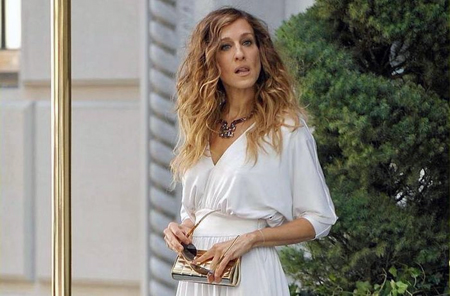
Celebrity designers: extension of modern culture or something less than desirable?
I think celebrity designers have always played an important supporting role in fashion and always will. The right dress on the right celebrity can truly set a designer on his or her way. It’s difficult to think of Givenchy without thinking of Audrey Hepburn. He dressed her both for movies and frequently in real life. It’s a system that has worked brilliantly for decades. What I have trouble with is celebrities over-reaching into domains for which they have no competence or training.
It’s bad enough when celebrities “design” their own eponymous clothing lines, but when Lindsay Lohan is given the keys to the design studio at Emmanuel Ungaro or when Sarah Jessica Parker uses her clout to secure the position of creative director at Halston Heritage, it ultimately cheapens fashion in the eyes of consumers. I mean no disrespect to either woman, but the message their forays into fashion design send to consumers is that anyone can do it. That is simply not true. It takes years of training and immense creative talent to develop the skills to create something truly memorable. If LiLo and SJP are so passionate about fashion that they want a career in the industry, let them train first. Let them learn the craft. Otherwise, the exercise is little more than celebrities cashing in on their fame. As a consumer of fashion, I find that deeply cynical both on the part of the celebrity and on the part of the brand. Again, consumers should ask themselves “what are they selling me?”
Luxury brands tend to miss the mark with targeted audiences like African Americans and working women. Why do you think that is and what do you think luxury brands need to do to capture those audiences?
The mistake many luxury brands make is the same mistake made by brands in other industries. They tend to look at any given group whether women, African Americans, or Latinos and treat them as a monolith. For instance, none of the African Americans I know take their style cues from Kanye or Beyonce, yet who do brands hire to sit front and center at their fashion shows or to front their ad campaigns? Kanye and Beyonce. I mean no disrespect to either performer but their appeal is essentially to the masses. If I were running a luxury brand, I would recruit someone like Desiree Rogers and set her to work on building the brand’s profile amongst affluent African American consumers. She has strong business credentials, a fantastic network of contacts and her personal style is pitch-perfect for the industry. Someone with her profile would no doubt have a much better sense of how to reach out to affluent African Americans and speak to them about a luxury brand.
Yves Saint Laurent once said, “Fashion fades. Style is eternal.” Do you agree?
Absolutely. Fashion is a powerful tool, no doubt. It allows you to “package” yourself and express who you are. This said, fashion is really only a means to an end. The most stylish people I know take fashion and interpret it. They make it their own and what emerges from this exercise is their personal style. You have to take a very critical look at what’s on offer and edit your choices carefully. I always cringe a bit inside when I see someone slavishly reproducing what they’ve seen on the runway or in a magazine when clearly it neither suits them or their lifestyle. That’s someone else’s vision of style, not their own.
How have fashion bloggers changed the landscape once dominated by traditional media?
Well, for one thing they’ve made the fashion industry sit up and take note. It’s quite remarkable when you think that just a few short years ago, no one would have thought to question the preeminence of fashion editors and journalists. Now, you have bloggers seated in the front row alongside top editors and buyers. This said, as some of the better-known bloggers start cozying up to the industry, the test will obviously be whether they will allow themselves to be co-opted by the brands who are showering them with perks and presents.
For many people, myself included, the appeal of fashion blogs lies in their unvarnished opinions and unflinching willingness to speak their mind. This was much easier to do when they were outsiders looking in with little or no vested interest in fashion’s ecosystem. Now that they have a seat at fashion’s table, I wonder whether they will continue to be as outspoken. I think this more than anything will determine whether they will have a lasting impact on the industry or whether they’re destined merely to be cast aside once their 15 minutes of fame are over.
If you were Anna Wintour…
Anna Wintour has a very tough job, so I don’t think I would want to be her, but to answer your question, I would probably play more to Vogue’s strengths. Blogs and websites are great at getting information out quickly, but are often very light on substance. With a monthly magazine, the goal should be to delve into more detail and offer a more nuanced, thoughtful take on things. I think most women crave substance in addition to visuals and Vogue has the ability to give them both.
Also, Vogue needs to get over its fixation on socialites. It harks back to a time when socialites were the only arbiters of taste, and Vogue the only source for fashion advice. That no longer holds true. Women today are better educated, better travelled, and more affluent than any time in history and we draw style inspiration and guidance from a wide array of sources. This is true across both social class and ethnicity, yet the ranks of Vogue are still populated by a narrow group of women leveraging their social status or birth rank into a career. I personally would so much rather read thoughtful pieces written by and about women with diverse backgrounds who are self-made and who incorporate style and fashion into their lives in ways I personally can relate to. I suspect I’m not alone in looking for this.
Name some fashion influencers that you respect.
I have a great deal of respect for women like Ines de la Fressange, Carine Rotfield, Iris Apfel–women whose style is so strongly individual. Each of their styles has evolved slightly over time but the core has remained essentially the same. That requires a very strong sense of self. I find that inspiring.
Are there any designers, not being hyped by traditional media, that you feel should be on everyone’s radar?
I think a designer like Rick Owens tends to get overlooked. You need to see beyond his dramatic runway shows and focus on the individual pieces he produces which are fantastic. Also, I’m increasingly into Dries Van Noten for really special pieces like an embellished jacked or a vibrant print. Roland Mouret also remains a favorite–his dresses make you feel polished and professional, yet still sexy, but in a very subtle way. He’s been adding separates to his collections–jackets, trousers, coats which are brilliant. They currently form the backbone of my professional wardrobe. I would also keep my eye on Erdem Moraglioglu, David Szeto, Duro Olowu–all three have a strong aesthetic. They’re definitely on my radar and I’m curious to see how they will evolve.
Interviewed March 2010 by Yolanda, Editor of Zavvi Rodaine.com
© Zavvi Rodaine.com 2010. No part of this interview may be used or reproduced in any manner without the express written consent of the Editor of Zavvi Rodaine.com.
| • Culture, Fashion | • Comments Off on Luxe Chronicles Interview |



